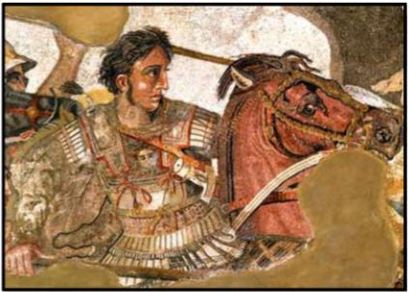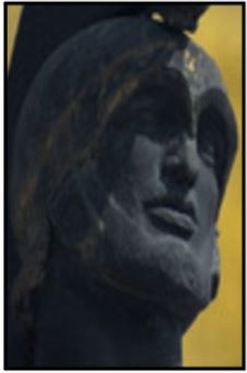
Interview a Great Greek
Directions: You will act out an interview between a news reporter and a great ancient Greek thinker. The interviewer will ask the Greek thinker about their theories & ideas and their achievements & accomplishments, as well as important personal information. You will write a script and act out your interview on camera. The interview will become a part of your History Block's news cast. Your interview will be about 5 minutes long.
In order to conduct a successful interview you will need to perform the following tasks.
Directions: You will act out an interview between a news reporter and a great ancient Greek thinker. The interviewer will ask the Greek thinker about their theories & ideas and their achievements & accomplishments, as well as important personal information. You will write a script and act out your interview on camera. The interview will become a part of your History Block's news cast. Your interview will be about 5 minutes long.
In order to conduct a successful interview you will need to perform the following tasks.

1. With your partners, you should brainstorm ideas for subtopics that relate to your interview subject.
2. Collaborate with your partners to come up with 15-20 "open-ended" questions. Avoid simple, yes-or-no questions.
3. Research your subject.
4. Work together to develop thoughtful answers to your questions and record your answers on your worksheet.
5. Write your script. Give special thought to the order in which you ask your questions.
A good interview will bring forth the answers to questions such as:
Be sure to include other information you feel is important or would be of interest.
You should prepare your interview in a professional manner.
To successfully answer those questions, you should know relevant information about the time period in which they lived. And, you should know how their actions changed or contributed directly to Greek culture and indirectly to our own culture. In other words, how do their actions or achievements influence us today?
2. Collaborate with your partners to come up with 15-20 "open-ended" questions. Avoid simple, yes-or-no questions.
3. Research your subject.
4. Work together to develop thoughtful answers to your questions and record your answers on your worksheet.
5. Write your script. Give special thought to the order in which you ask your questions.
A good interview will bring forth the answers to questions such as:
- Why is this Greek famous?
- Why are their theories, ideas, achievements, or accomplishments important?
- How did this Greek help shape the world?
Be sure to include other information you feel is important or would be of interest.
You should prepare your interview in a professional manner.
To successfully answer those questions, you should know relevant information about the time period in which they lived. And, you should know how their actions changed or contributed directly to Greek culture and indirectly to our own culture. In other words, how do their actions or achievements influence us today?

Here are some examples of famous Greeks that are remembered today:
- Aeschylus (playwright)
- Alexander (conqueror/ ruler)
- Archimedes (mathematician/ inventor)
- Aristophanes (playwright)
- Aristotle (philosopher/ teacher)
- Empedocles (philosopher)
- Euclid (mathematician/ “father of geometry”)
- Euripides (playwright)
- Herodotus (historian/ “father of History”)
- Hippocrates (physician/ “father of medicine”)
- Homer (epic poet/ author of “The Iliad” & “The Odyssey”)
- Lycurgus (father of Sparta)
- Pericles (orator/ statesman/ general/ rebuilt Athens after Persian Wars)
- Plato (philosopher/ teacher/ student of Socrates)
- Pythagoras (mathematician/ mystic/ scientist)
- Ptolemy (mathematician/ scientist)
- Socrates (philosopher/ teacher)
- Solon (statesman/ lawmaker/ poet)
- Thales of Miletus (“father of philosophy/ father of science)

Checklist:
1) You provide a neat, organized copy of your script for your interview. (15 points) _____
2) Your interview tells the class about the theories, ideas, accomplishments, and important personal information of the Greek that you interview. (50 points) _____
3) Your interview shows that you have practiced. Be loud, clear, and well organized. (10 points) _____
4) You keep track of your sources and correctly fill out and turn in a source list. (10 points) _____
5) You correctly complete and turn in your task lists and peer evaluations. (10 points) _____
6) I get 5 points to award or take away depending on how focused you are in class and how well you work together as a team.
Total Points: 100 points possible.
Extra Credit: You can earn an additional 5 points for dressing like an ancient Greek. You can earn an additional 10 points for filming a 30 second "commercial." See me for details.
1) You provide a neat, organized copy of your script for your interview. (15 points) _____
2) Your interview tells the class about the theories, ideas, accomplishments, and important personal information of the Greek that you interview. (50 points) _____
3) Your interview shows that you have practiced. Be loud, clear, and well organized. (10 points) _____
4) You keep track of your sources and correctly fill out and turn in a source list. (10 points) _____
5) You correctly complete and turn in your task lists and peer evaluations. (10 points) _____
6) I get 5 points to award or take away depending on how focused you are in class and how well you work together as a team.
Total Points: 100 points possible.
Extra Credit: You can earn an additional 5 points for dressing like an ancient Greek. You can earn an additional 10 points for filming a 30 second "commercial." See me for details.
